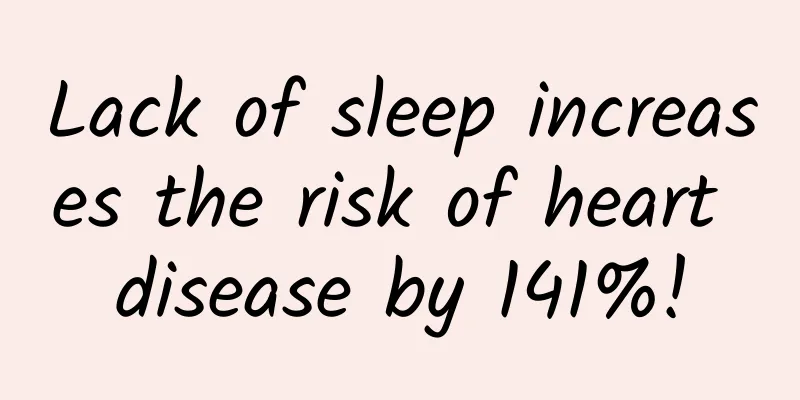Lack of sleep increases the risk of heart disease by 141%!

|
A study recently published in Scientific Reports found that poor sleep quality may damage heart health and increase the risk of heart disease by 141%. The study reviewed sleep data from 6,820 U.S. adults, with an average age of 53, who self-reported their personal sleep characteristics and heart disease history. Of the participants, 633 wore a research device (an actigraph) on their wrist to capture their sleep activity. The researchers looked at multiple aspects of sleep health, such as regularity, satisfaction, alertness while awake, sleep duration, sleep efficiency and sleep duration, and linked them to doctor-diagnosed heart disease. The researchers found that for each additional self-reported sleep health problem, the risk of heart disease increased by 54 percent. Among those who provided sleep data both through self-reporting and research devices, the increased risk of heart disease due to poor sleep health was much higher — a 141 percent increase, a figure considered more accurate. "These findings suggest that understanding a person's 'sleep health problems' is important for assessing heart disease risk. This study is the first to demonstrate that more sleep health problems may increase heart disease risk in middle-aged adults," said Soomi Lee, assistant professor in the USF School of Aging Studies and the study's lead author. "Those who provided both self-reported and monitored sleep data had a higher risk, suggesting that accurate and comprehensive measurement of sleep health is important for preventing heart disease." The research team asked participants about their health, including whether their doctor had confirmed they had heart disease such as arrhythmias, heart murmurs or an enlarged heart. High blood pressure was flagged as a risk factor for heart disease. They also looked at participants' family history of heart disease and sociodemographic factors such as race, sex, smoking history, depression and physical activity. The researchers found that while women reported more sleep health problems, men were more likely to have heart disease, but gender did not affect the overall correlation between the two factors. They also found that black participants had more sleep health problems and higher rates of heart disease than white participants, but the strong link between sleep health and heart disease did not change overall by race. Lee said that while sleep health is important for people of all ages, the team focused on midlife because it is a longer period and has more diverse life experiences and greater stress due to work and family roles. This stage is also when heart disease and age-related sleep problems begin to emerge. Because sleep health can be improved, the findings could help develop preventive strategies to reduce the risk of heart disease, the researchers said. Source: China Science Daily Author: Li Muzi Related paper information: https://www.nature.com/articles/s41598-022-05203-0 The pictures in this article with the "Science Popularization China" watermark are all from the copyright gallery. The pictures are not authorized for reprinting. |
Recommend
What to do if your menstrual flow is light after abortion
Physical health is often closely related to menst...
What causes brown discharge from below?
Gynecological diseases are more common in women. ...
Cervical biopsy Chronic inflammation of mucosa
If the doctor proposes a better treatment plan fo...
Brown discharge after a few days of menstruation
During menstruation, there will be a large amount...
What should I do if there are two lines on the pregnancy test paper?
Recently, I often hear people say that many of th...
Drunk, drunk again! The pain of the medical staff who received the patient
At five o'clock in the morning, Xiao Li, who ...
What is the cause of vaginal pain and bloody vaginal discharge?
The vagina is a very important physiological part...
Can I eat eggplant during pregnancy?
During pregnancy, expectant mothers are more and ...
What does durian symbolize about love? What are the dangers of eating durian every day?
Durian is a famous tropical fruit. The fruit is o...
What are the signs of nightmares in pregnant women?
Some people are very superstitious and believe th...
Shocking! The death of a famous writer was actually related to this "silent killer". Be careful in winter!
"I will leave you quietly, ... I think it wi...
What to do if endocrine disorders occur after abortion?
There are many women who get pregnant unexpectedl...
Does eating ice watermelon during pregnancy affect the fetus?
Can pregnant women eat frozen watermelon? This is...
EyeTrackShop: A study on eye movement heat maps of profile pages on foreign social networking sites
EyeTrackShop recently released an analysis report...









